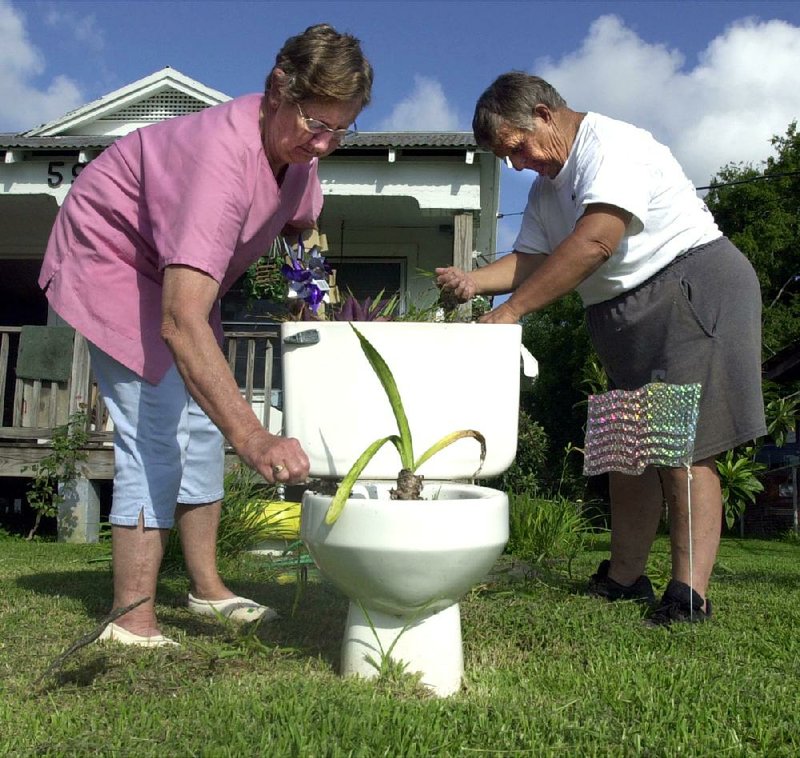LITTLE ROCK — Dear Otus,
We are personal friends of the Cotter family of Scott, but I lost your column about them and their commode farm. Could you reprint it while you’re on vacation?
- John Harrington, England
Dear John,
It was wholly a pleasure to hear from you and I’d be delighted. Here it is from June 12, 2004.
The commode had been almost like a member of the family for 27 years. In the end, she had to be “put down” by the Plumbco professional.
She was a venerable 51 years old. That’s not all that old for people, but in porcelain years, that’s about 94.
The toilet was part of the home’s original equipment - all shiny and new when the pink and green tile “master” bath was finished in 1953. She must have been something to see in her prime.
She was an American Standard - one of the classic, no-frills, post-war suburban models. A full-size, gravity-fed, 7-gallon serious flushing machine, the toilet was a daily reminder of an idyllic age before conservation creep set in.
These days, federal regulations limit maximum toilet tank capacity to an anemic 1.6 gallons per flush (GPF). That may help preserve our precious dwindling natural resources, but it hardly gives a satisfying whoosh.
The old American Standard used to rattle the floor and frighten small children. You knew she meant business when you tripped her handle.
“Green” advocates tell us the new low-flow conveniences save Americans $11.3 million in wastewater bills every day. Ah, but what’s saved in money is often lost in job satisfaction.
Last week Owner sadly informed Master Ben that the old gal was on her last few flushes and that only a bucket beneath her failing tank kept her from having her water valve shut off immediately.
Since this was the beloved commode upon which Master Ben was potty trained more than 20 years ago, Owner wanted to know whether Ben had any preference as to how to handle the carcass.
Did he prefer that the toilet be sent to the Cotter Commode Farm near Scott, or humanely pulverized and her porcelain dust scattered over the “pet cemetery” in the side yard (where, by the way, my corporeal remains repose beneath ivy and guarded by garden gnomes).
Oddly, Master Ben had no sentimental attachment to the toilet. I believe his exact response was, “Whatever.”
Ah, youth. I suppose one must wear the burden of many more years before the blanky of nostalgia comforts the weary soul.
Owner opted for the Cotter Commode Farm.
The farm is a lovely alternative for those so inclined. Nonfunctioning toilets can now spend the rest of their days repurposed as planters.
The Cotters live just off Arkansas 161 about seven miles south of Scott in the Estes community. The farm backs up to Georgetown Lake and contains approximately 8,700 toilets.
The Cotters have been providing this service - a “labor of love” - for 17 years.
What started as a final creative “resting” place in their front yard for one of their old beloved family commodes (see photo) is now an impressive, landscaped 17-acre field of porcelain and petunias, vitreous china and chrysanthemums.
There is even a cash crop soybean section planted in old overturned portable toilets down by the lake.
It’s a marvel to behold and one neighbor calls it the “Arlington National Cemetery for toilets.”
There’s even a secluded special section set aside for retired bidets.
“When one of your toilets goes terminal,” Cotter says, “you can tell the kiddies it’s going to live on a farm in the country. It makes it easier for them that way.”
Cotter smiled and added, “Just don’t call them ‘pot’ plants.”
Cotter, a retired maintenance worker at the nearby David D. Terry Lock & Dam, says visitors are welcome on weekends and admission is free. There is, however, a donation box to help defer the cost of fertilizer.
If you visit the farm you can check out Owner’s old toilet. It has been installed in Section 7, lot 18, space 3 - in the “Garden of Perpetual Ballcocks.” Cotter says he plans to plant Louisiana swamp irises in the thing come spring.
Until next time, Kalaka reminds you to always put the seat down.
Disclaimer
Fayetteville-born Otus the Head Cat’s award-winning column of humorous fabrication appears every Saturday. E-mail:
HomeStyle, Pages 42 on 11/24/2012
